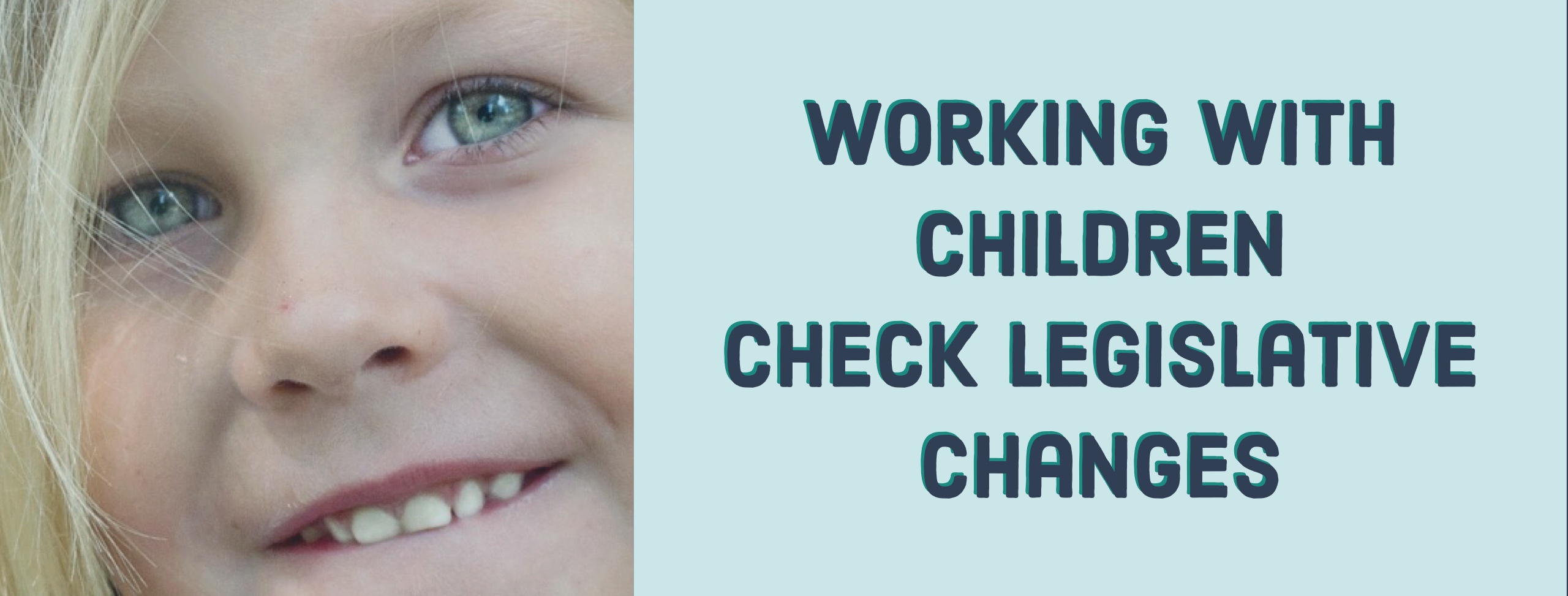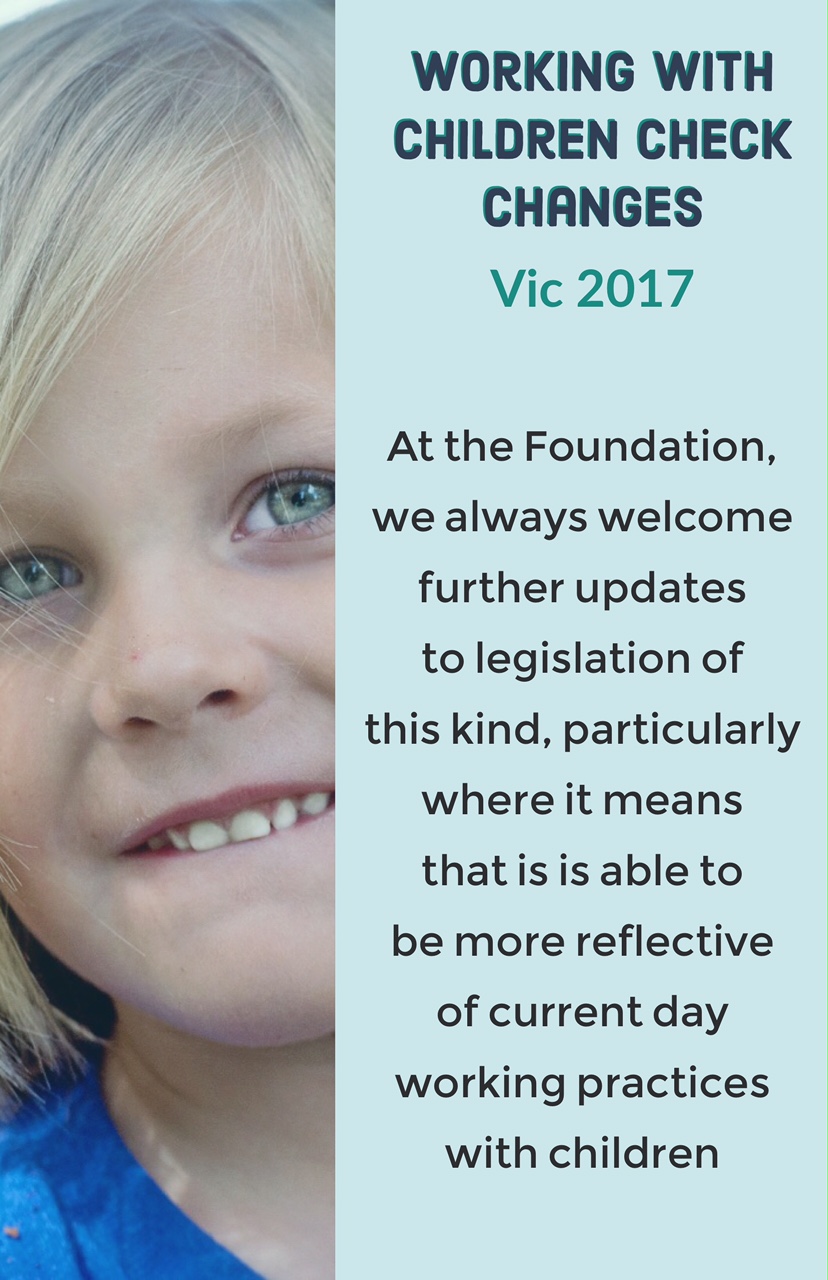
Legislative Changes to Working with Children Checks in Victoria

This blog article was authored by Helen Barnes, Senior Advisor,
in the Safeguarding Children Program at the Australian Childhood Foundation.
The Australian Childhood Foundation has noted that there are some key updates occurring with the Working with Children Check requirements in Victoria. According to the Victorian Department of Justice and Regulation Working with Children Check Unit, these amendments to the Working with Children Act 2005 were made in response to recommendations made by the Royal Commission into Institutional Responses to Child Sexual Abuse in relation to strengthening the protection of children through Working with Children Checks.
As part of this blog, we’ve provided a snapshot of some of the key amendments based on the information that is provided on the Victorian Working with Children Check website –please remember that this is just a  snapshot though, and that it is the responsibility of all organisations to ensure they are familiar with the amendments. We encourage all of our Victorian colleagues, and in particular our Safeguarding Children Program participants, to ensure they take the time to review the changes on the Working with Children Check website, found here.
snapshot though, and that it is the responsibility of all organisations to ensure they are familiar with the amendments. We encourage all of our Victorian colleagues, and in particular our Safeguarding Children Program participants, to ensure they take the time to review the changes on the Working with Children Check website, found here.
Key changes that came into effect from 1 May 2017:
- Kinship carers (family members and other persons of significance to a child who provide a child with out-of-home care under the Children, Youth and Families Act 2005) will be required to apply for a Working with Children Check (Check). This is because kinship carers are now being considered a type of child-related work and added as a specific occupational field (and therefore even though there is an exemption on checks for individuals closely related to a child, this does not apply if the person is their kinship carer). In terms of implementation, this amendment requires that all new kinship carers from 1 May 2017 will be required to apply for the Working with Children Check within 21 days of having a child placed in their care. On the other hand, kinship carers who already have a child placed in their care (i.e. pre-existing carers) will have until 22 August 2017 to apply for a Working with Children Check.
Changes coming into effect as at 1 August 2017:
- Expanding the definition of ‘direct contact’ in the Act. The definition of direct contact will now include oral, written or electronic communication as well as face-to-face and physical contact. Previously, the definition of ‘direct contact’ only referred to physical contact or face-to-face oral communication with a child.
- Removing references to ‘supervision’ in the Act. This will mean that even if a person’s contact with children as part of their child-related work is supervised by another person, they will still need to apply for a Check (which they previously did not).
- Ensuring that non-conviction charges (charges that have been finally dealt with other than by a conviction or finding of guilt – such as a charge which has been withdrawn, discontinued, quashed on appeal, or led to an acquittal) for serious sexual, violent or drug offences are considered as part of Check assessments and re-assessments. This update is bringing the Victorian check in line with all other state and territory Working with Children Check requirements.
- Enabling the Secretary to the Department of Justice and Regulation to compel the production of certain information for the purposes of compliance monitoring (i.e. if they suspect that a person has committed an offence against relevant Working with Children Check legislation). Examples of the types of offences include: someone engaging in child-related work without a Check, someone engaging another person in child-related work without a Check, the use of a volunteer check for paid work, and an agency offering the services of a person who doesn’t hold a Check.
- The Act will now clarify that the categorisation of assessment and re-assessments is determined by the age of the applicant at the time the offence or alleged offence was committed. If the person has become an adult during an offence that has occurred over a period of time, then they will be considered an adult.
- Category A offences (i.e. as categorised for the assessment / re-assessment processes) will now include: regardless of the age of the victim, the equivalent interstate offences of murder, attempted murder, rape and attempted rape; and any interstate child abuse material offences.
- A person who was been charged with, convicted or found guilty of the offence of carnal knowledge (i.e. sexual intercourse with a child) whilst they were also a child is not restricted to work with children while their application is being assessed, however, anyone who was an adult at the time of being charged, convicted or found guilty must not engage in child-related work whilst their application is assessed.
Here at the Australian Childhood Foundation, we always welcome further updates to legislation of this kind – particularly where it means that it is able to be more reflective of current day working practices with children, and in line with research and findings of best practice such as those recommended by the Royal Commission.
